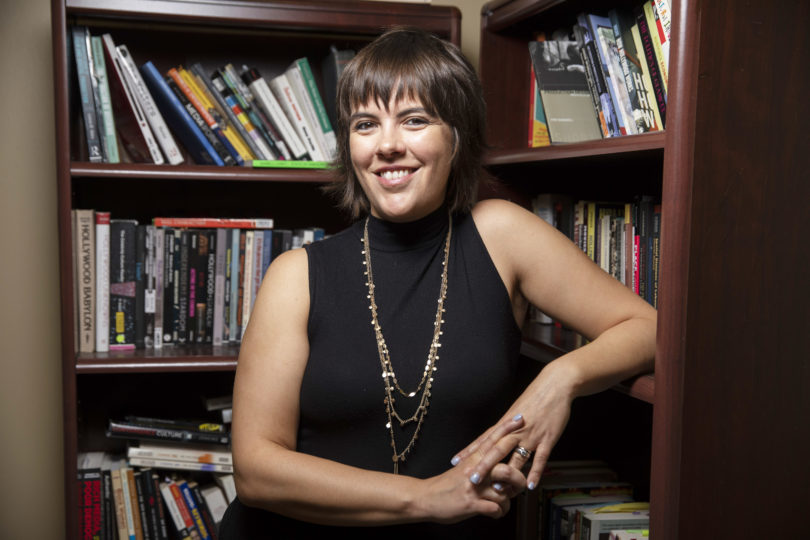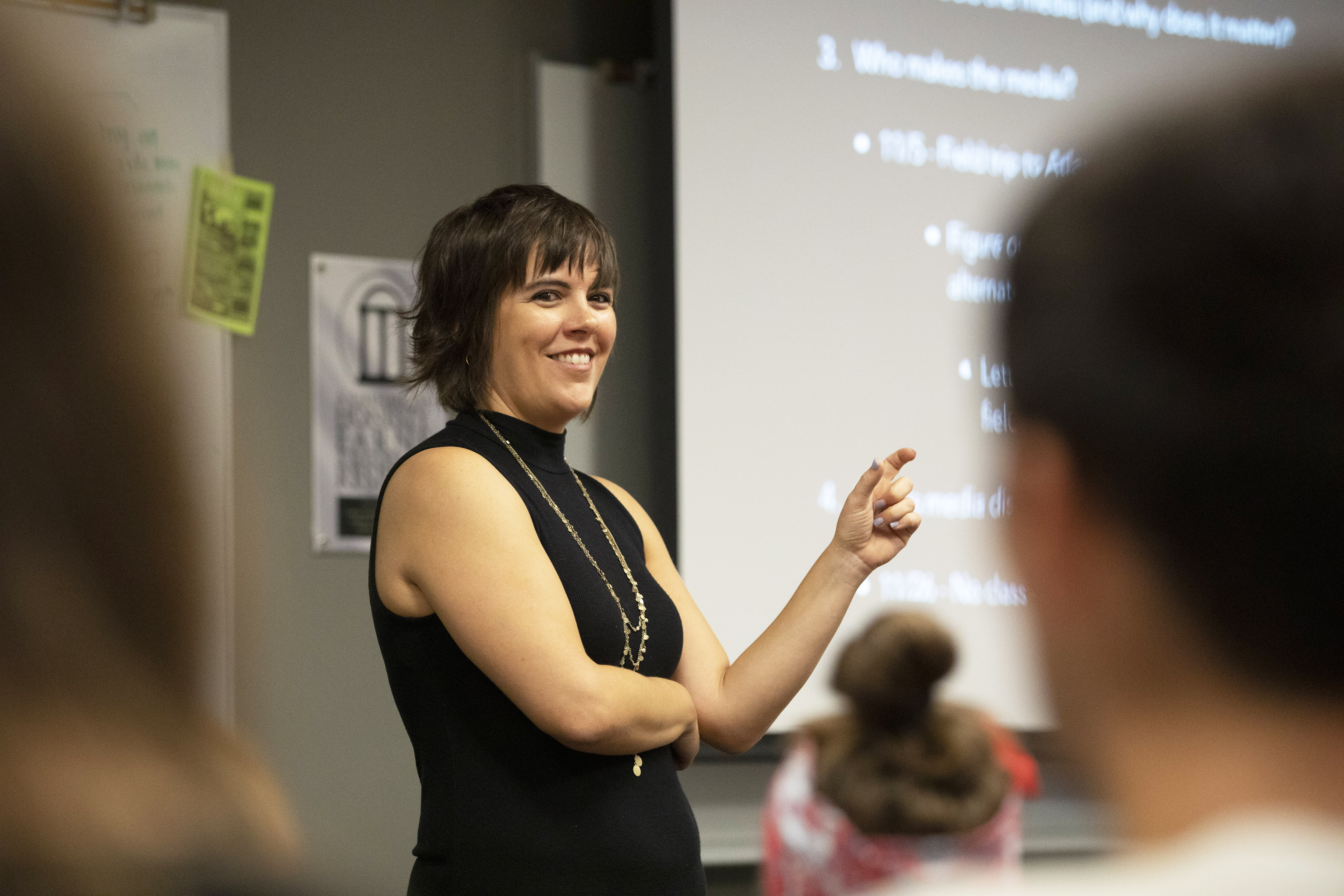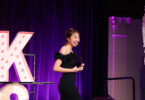Kate Fortmueller, assistant professor of entertainment and media studies in the Grady College of Journalism and Mass Communication, helps prepare students for careers in the growing Georgia media industry and beyond.
Where did you earn degrees and what are your current responsibilities at UGA?
I earned my Bachelor of Arts degree from Smith College and my Master of Arts and Ph.D. from the School of Cinematic Arts at the University of Southern California.
I am an assistant professor in the department of entertainment and media studies in the Grady College of Journalism and Mass Communication, where I teach undergraduate and graduate courses in media theory and media industry. I also lead the Grady Los Angeles program periodically.
When did you come to UGA and what brought you here?
I came to UGA in 2016 as the first new faculty hire in the department of entertainment and media studies.
What are your favorite courses and why?
I teach courses in media theory and media industries. I love teaching both, but they are very different courses. In the media industries course, my goal is to give students an overview of the history, hierarchies, key debates and developments in the screen industries – it’s a lot to cover in a semester, and we are always talking about current issues facing the industry. Most recently, we have spent time talking about changes to streaming platforms, production centers outside Los Angeles—including the growing Georgia media economy—and the ongoing negotiations between the Writer’s Guild and Hollywood talent agents. In media theory, we watch and discuss television shows, films and music videos, and I help students explore how people have studied, written and thought about media. My hope in that class is that the aspiring media makers will take all of those big ideas and critiques of media and apply those to their own creative practice.
What are some highlights of your career at UGA?
This year I finished writing my book, “Hollywood Freelance,” which is a cultural history of working screen actors. It will still go through another round of revisions, but completing the manuscript and sending it off to my editor felt like an important milestone.
How do you describe the scope and impact of your research or scholarship to people outside of your field?
Media scholars look at media texts, creators and audiences, but my focus is primarily on media makers and workers as a labor force across screen-based industries. I am interested in how media production, hierarchies in the industry and the culture of media workers influence the kinds of stories that get told, what we ultimately see on screen and who can be successful in the industry. Much of my work has focused on working actors—familiar faces from film and television whose names you might not know across the history of the film and television industries.
How does your research or scholarship inspire your teaching, and vice versa?
In my research I spend a lot of time in archives, but I also spend time interviewing industry professionals and visiting sites to get firsthand experience and accounts. Embracing the industry perspective in my own work means that I am often looking for ways to enhance student learning through conversations with professionals or interactive simulations. I push my students to make sure that they never take professional advice at face value or accept the status quo.
What do you hope students gain from their classroom experience with you?
Many of the students I teach want to make a living making media, whether that means film, television or branded content. Regardless of their professional aspirations, I want students to develop strong critical thinking skills, which includes understanding the relationship between industrial practices, media makers (and their working conditions) and media texts.
Describe your ideal student.
I like students who think big ideas and take intellectual or creative risks. It’s exciting for me when students make connections between my classes and what they are learning in other classes – it shows me that they are really engaged with the world and their surroundings, and it’s fun to be around creative thinkers.
Favorite place to be/thing to do on campus is …
I love the Richard B. Russell Building Special Collections Libraries. It’s a beautiful building, and the librarians do a really great job with all the rotating exhibits. I was especially excited to see Cindy Wilson’s Mondrian dress and boots on display in my first year at UGA.
Beyond the UGA campus, I like to …
I’m known by name at the local Athens movie theaters and at Pure Barre, so that is a fairly good indicator of what I do with my time in Athens.
Community/civic involvement includes …
I come from a high school background that placed a very high value on volunteer work and community engagement, and I even participated in one of their first service-learning trips to Peru in 2001. However, I think community and civic involvement does not necessarily need to be a big project—it can be as simple as making conscious choices in your daily life, whether that means voting in elections, being more conscious of your waste and consumption, or buying your books at Athens’ own Avid Bookstore rather than on Amazon.
Favorite book/movie (and why)?
This is always a tough question for me to answer because movies and television shows have a lot of different and important functions in my life. This could be answered by considering the media I write about (“Bhowani Junction,” Edith Head’s costume design work), what I think of as great art (everything by Agnes Varda), what I love to teach (“Rear Window,” “Illusions,” etc.) and “comfort movies” (“Charade,” “The Burbs,” etc.) that I use to relax. But, in order to answer the question with a single film, I’ll go with “Spotlight.” As I was writing my book I used “Spotlight” as a kind of background noise (like some people use music). Although this is a great technical film that deserved its Oscars and critical accolades, my reason for singling this film out relates more to how the film connected to me over the past three years. This film was inspirational for me during the writing process because it is a movie about the social importance of research. I can’t think of another film with a montage scene of people just reading and highlighting – sort of like the “Rocky” training montage, but for researchers. I haven’t watched it since I finished the book, so I will need to figure out what movie will accompany my next big project!
The one UGA experience I will always remember will be …
I am consistently impressed by the generosity of UGA alumni. One of my favorite Grady LA memories is sitting in on a “Simpsons” table read with alumnus Chris Edgerly. After the table read he walked students around the Fox lot and spent a lot of time talking with students before bringing us in to watch him rerecord some dialogue and songs for an episode. Experiences like this one, where I get to spend time with current students and alumni, give me a sense of being part of a larger UGA community.






